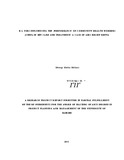| dc.contributor.author | Mwangi, Martha M | |
| dc.date.accessioned | 2012-11-28T12:27:04Z | |
| dc.date.available | 2012-11-28T12:27:04Z | |
| dc.date.issued | 2012 | |
| dc.identifier.uri | http://erepository.uonbi.ac.ke:8080/xmlui/handle/123456789/7011 | |
| dc.description.abstract | The purpose of this study is to examine factors influencing the performance of Community Health Workers in HIV care and treatment in AIDS Relief Kenya. The objectives of this study are; to ascertain the extent to which institutional strategies influence the performance of Community Health Workers in HIV care and treatment in AIDS Relief Kenya; to establish the influence socio-cultural values of Community Health Workers have on their performance in HIV care and treatment in AIDS Relief Kenya and to determine how sustainability of the Community Health Workers programme influences their performance in HIV care and treatment in AIDS Relief project Kenya .
The research study employed a descriptive survey design that used multi stage sampling methodology with the sampling frame being constructed from the AIDS Relief database on the Counties, Community Health Workers and Local Partner Treatment Facilities (LPTFs) in which the AIDS Relief project operates. The sample size was 168 Community Health Workers.The research study adopted multi stage sampling methodology and utilized purposive sampling and simple random sampling methods to sample 2 out of the 6 Counties 2 out of the 29 LPTFs and 4 community nurses who are in charge of the Community Health Workers from the 2 LPTFs.
Simple random sampling was then used to sample 136 CHWs from Mombasa and Nazareth Local Partner Treatment Facilities (LPTFs) to ensure that each CHW had an equal chance of being selected. Data collection was administered using questionnaires and interviews. Secondary data was gathered through literature review. Raw data was coded and analysed through Statistical Package for Social Scientists.
The study findings indicate that institutional strategies have an influence on performance of Community Health Workers with the following revelations: most of the respondents confirmed participation in the CHW trainings, trainings were also found to be of good quality and frequency of meetings was found to be very good. Recognition by the client and the community was found to be most important for a majority of the CHWs. Task shifting was also found to be implemented. The study revealed that financial and non-financial incentives will need to be addressed. The study also established that socio cultural values influenced performance of Community Health workers.
The study established that most of the CHWs were female. Majority of the respondents were between ages 36-45. The research indicates that CHWs have low levels of education with majority having attained primary level education. The research also found that the sources of income especially CHW allowance were not adequate for the CHW s and most of them engaged in small businesses and other employments to be able to fend for their families. Majority of the respondents received support from their families. Sustainability factors also influenced the performance of CHWs and the study found out that majority of the respondents had a focal point person and also majority of the Community Health Workers had guidelines and protocols.
The respondents felt that there was community ownership and participation. Majority of the respondents confirmed that there was a clear selection criterion that is easily available and utilized. Integration of the CHW programmes is a critical component of sustainability and most of the respondents confirmed that there was either partial or full integration. Majority of the respondents confirmed that they have a defined catchment area.
The study recommended improvement on the terms of engagement for the CHWS, repackaging the CHW model to attract more men, focus on age bracket 18-25 and 26-35 to address the needs of teenagers and youth and ensuring the CHW programmes are integrated in other facility activities for sustainability purposes and improvement of the relationship between the CHW and the supervisor. | en_US |
| dc.language.iso | en_US | en_US |
| dc.publisher | University of Nairobi, Kenya | en_US |
| dc.title | Factors influencing the performance of community health workers (CHWS) in HIV care and treatment: a case of AIDS relief Kenya | en_US |
| dc.title.alternative | Thesis (MA) | en_US |
| dc.type | Thesis | en_US |

